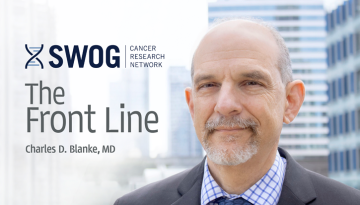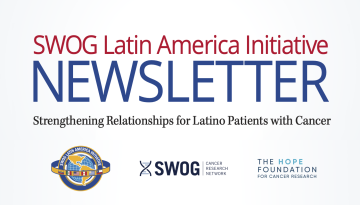Five Fulfilling Years of Service
This is a surprisingly difficult column to write. To me, it seems at first glance to be shockingly self-serving. However, at our San Francisco meeting, I am coming up for a board of governors’ election for a second term as SWOG chair. Even though I am running unopposed, there will be a yes or no vote. Governors – and my readers – have the right to know what I’ve done at the helm. And maybe what more there is to do.
In 2012, I became SWOG group chair-elect. Serving you these last five years has been fulfilling, challenging, and, often, downright fun. When I ran in that first election, I promised you quite a few things. I promised more transparency and inclusion – and fewer silos. I also promised to help SWOG become a more patient-centered, pathway-driven organization.
I am proud of my efforts to deliver on these promises. To improve accountability, I launched this weekly blog, aimed at sharing news and explaining upper-level decision-making. For the same reasons, and to help us more easily track progress, I created an annual impact report to share key statistics on our cancer trials. I instituted term limits for committee chairs and executive leaders, including the group chair, in order to expand opportunities for rising members and to keep us from getting stale. I’ve also worked hard to be inclusive. I created the VA Integration Support Program, with support from The Hope Foundation, to enroll more military veterans onto our trials. I formed the recruitment and retention committee to help members enroll more underrepresented patients – and also expanded that committee’s charge to include increasing diversity in SWOG membership and leadership. A major inclusion and collaboration effort is our SWOG Latin America Initiative, (SLIA) which reaches over our national borders to include more international researchers. I didn’t start SLIA – Drs. Larry Baker, Manuel Valdivieso, and John Crowley get the credit for that achievement. But I supported a SLAI expansion that last year alone trained over 300 clinical trial professionals in Mexico, Peru, and Colombia.
SWOG today is wonderfully patient-centered. We’ve expanded the size of our patient advocacy committee to 18 members, and SWOG now ties with the Alliance for the biggest advocate group in the NCTN. I’ll argue we certainly have the most experienced advocates, with members reviewing for major cancer research grant programs, running national and international cancer advocacy nonprofits, and serving in a variety of leadership roles for the NCI, ASCO, AACR, and more. Thanks to the leadership of SWOG investigator Dr. Scott Ramsey and SWOG Advocate Chair Rick Bangs, a PCORI-funded research project has more tightly integrated our advocates into the triage trial review and approval process.
SWOG is also more pathway-driven, though that credit must be shared with Drs. James Rae and Lee Ellis, as well as a number of our committee chairs and investigators. In the last three years, we launched two major precision medicine trials. One is Lung-MAP, which tests a variety of targeted therapies and immunotherapies for patients with squamous cell lung cancer. The other is DART, our immunotherapy trial for rare cancers. I thank everyone supporting our translational medicine efforts, including those in our Integrated Translational Science Center, which includes our partners at Cold Spring Harbor Laboratory and The Jackson Laboratory.
We have more cross-committee communication, including but not limited to a monthly call for committee chairs. One aim of the calls is to explore common genetic pathways shared by several cancers, and also to look to our fellow members to crowd-source solutions to common problems, ranging from insufficient finances to studying rare subsets of diseases.
Finally, how can I not throw a nod out to the first adolescent and young adult committee in the NCTN, or our popular and useful new private Facebook group?
Looking ahead, if elected, I will stay true to these ideals. Transparency, inclusion, and accountability are here to stay. I will keep our work open and collaborative, instituting data dashboards for leadership and membership and continuing to forge new partnerships within the NCTN, with industry, and with the public. There’s also plenty of room to go deeper with patient engagement in our trials, and to test more pathway-driven cancer drugs. Science and the patients we serve will continue to be touchstones for me.
I’m sorry for all the “I’s” above. I wish I could make some joke about there being no “I” in SWOG, but it’s been done before - and I couldn’t do anything clever with our initials. I encourage you to write to me directly – blankec@ohsu.edu – and let me know your thoughts on our future. I’m eager to hear your ideas and not simply blather about mine.
Other Recent Stories



